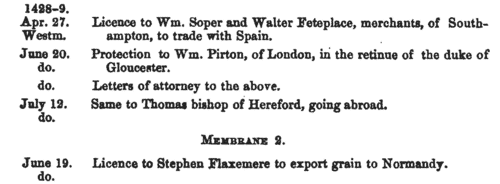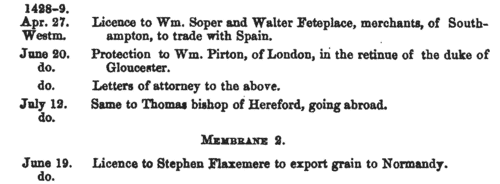Brynkley Surname Ancestry ResultsOur indexes 1000-1999 include entries for the spelling 'brynkley'. In the period you have requested, we have the following 5 records (displaying 1 to 5): Buy all | | | Get all 5 records to view, to save and print for £24.00 |
These sample scans are from the original record. You will get scans of the full pages or articles where the surname you searched for has been found. Your web browser may prevent the sample windows from opening; in this case please change your browser settings to allow pop-up windows from this site. The English in France
(1432)
King Henry VI of England (one of the grandsons of Charles VI of France) claimed the throne of France (and quartered the fleurs-de-lis of France with the lions of England on the royal standard) as had his predecessors since Edward III, as descendants of Philip IV of France. The English had real power or influence in Brittany, Normandy, Flanders and Gascony, and actual possession of several coastal garrisons, in particular Calais, where the French inhabitants had been replaced by English. Henry VI came to the throne only seven years after his father had trounced the French at Agincourt; but his cousin, Charles VII, who became king of France in the same year, spent his long reign rebutting the English king's claim to his throne by territorial reconquest and consolidation. The English administration kept a series of records called the French Rolls. On these are recorded royal appointments and commissions in France; letters of protection and safe-conduct to soldiers, merchants, diplomats and pilgrims travelling to France from England and returning, and to foreign legations. There are also licences to merchants to export to the Continent, and to captains to transport pilgrims. As Henry VI's reign progressed, and the English grip on northern France loosened, the French Rolls also increasingly include entries concerning the ransoming of English prisoners.BRYNKLEY. Cost: £6.00.  | Sample scan, click to enlarge

| The English in France
(1433)
King Henry VI of England (one of the grandsons of Charles VI of France) claimed the throne of France (and quartered the fleurs-de-lis of France with the lions of England on the royal standard) as had his predecessors since Edward III, as descendants of Philip IV of France. The English had real power or influence in Brittany, Normandy, Flanders and Gascony, and actual possession of several coastal garrisons, in particular Calais, where the French inhabitants had been replaced by English. Henry VI came to the throne only seven years after his father had trounced the French at Agincourt; but his cousin, Charles VII, who became king of France in the same year, spent his long reign rebutting the English king's claim to his throne by territorial reconquest and consolidation. The English administration kept a series of records called the French Rolls. On these are recorded royal appointments and commissions in France; letters of protection and safe-conduct to soldiers, merchants, diplomats and pilgrims travelling to France from England and returning, and to foreign legations. There are also licences to merchants to export to the Continent, and to captains to transport pilgrims. As Henry VI's reign progressed, and the English grip on northern France loosened, the French Rolls also increasingly include entries concerning the ransoming of English prisoners.BRYNKLEY. Cost: £6.00.  | Sample scan, click to enlarge

| Inhabitants of Suffolk
(1524)
The lay subsidy granted by Act of Parliament in 1523 was a tax on the laymen (as opposed to clergy), levied on householders, landowners, those possessing moveable goods worth £1 or more, and all workmen aged 16 or over earning £1 or more per annum. Real estate was taxed at a shilling in the pound; moveable goods worth £1 to £2 at fourpence a pound; £2 to £20 at sixpence a pound; and over £20 at a shilling in the pound. Wages were taxed at fourpence in the pound. Aliens were charged double; aliens not chargeable in the above categories had to pay a poll tax of eightpence. The records of the assessment for the county of Suffolk, mostly made in 1524, survive in 64 rolls in the National Archives. From 42 of these a compilation for the whole shire was printed in 1910 as Suffolk Green Book x. This includes a list of defaulters of 1526 and a subsidy roll of 1534 for Bury St Edmunds.BRYNKLEY. Cost: £4.00.  | Sample scan, click to enlarge

| Somerset testators and legatees
(1501-1530)
Somerset was almost coextensive with the diocese of Bath and Wells, which exercised local probate jurisdiction through its consistory and archdeaconry courts: but superior to the diocese was the province of Canterbury. Somerset testators who also had property outside the county had their wills proved in the Prerogative Court of Canterbury (PCC). The Somerset Record Society embarked on a program of publishing genealogical abstracts of the registered copy wills of Somerset testators in the PCC archives, and in 1903 (volume xvi) printed abstracts edited by the Reverend F. W. Weaver from the PCC registers 1501-1503 (register Blamyr), 1504-1506 (Holgrave), 1506-1508 (Adeane), 1508-1511 (Bennett), 1511-1514 (Fetiplace), 1514-1517 (Holder), 1517-1520 (Ayloffe), 1520-1522 (Maynwaryng), 1523-1525 (Bodfelde), 1525-1528 (Porch) and 1529-1530 (Jankyn). In addition, the volume includes abstracts of 48 Somerset copy wills in the registers of the Archbishops of Canterbury at Lambeth Palace Library from 1363 to 1491. The heading of each abstract gives the year of making the will (not the year of probate) and the testator's name in bold. Below that is the quire number and name of the PCC register. Date and details of probate are given at the foot of each abstract. Spellings of surnames are preserved as they appear in the registered copy wills, and may vary within a single document.BRYNKLEY. Cost: £4.00.  | Sample scan, click to enlarge

| Boys at Eton
(1441-1698)
King Henry VI founded a college at Eton in Buckinghamshire in 1440, 'to the praise, glory and honour of the Crucified, the exaltation of the most glorious Virgin His mother, and the establishing of holy Church His bride'. From this foundation has evolved the modern public school. Sir Wasey Sterry compiled a register for the college from 1441 to 1698, from a variety of surviving records, and including groundwork from his 'A List of Eton Commensals' of 1904, and R. A. Austen-Leigh's 'A List of Eton Collegers' of 1905. This resulting 'Eton College Register' was published in 1943. Because of the variety of underlying materials, the entries vary greatly in depth: some names survive only as a surname of not too certain date. In the fullest entries, the surname (often with a variant spelling) is given first, in bold, followed by the years of entry and leaving. The christian name is given next; then birthplace, and name of father. The initials K. S. (King's Scholar) indicate a scholar on the foundation. There will then follow a summary of the man's career, death, burial and probate; and the sources for the information, in italics, at the end of the entry.BRYNKLEY. Cost: £4.00.  | Sample scan, click to enlarge

|
Research your ancestry, family history, genealogy and one-name study by direct access to original records and archives indexed by surname.
|







